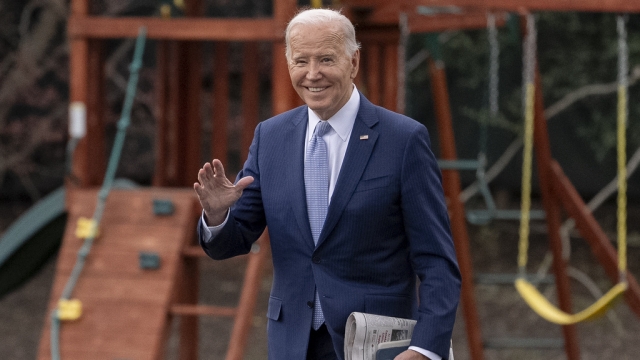President Joe Biden on Saturday signed a $1.2 trillion package of spending bills after Congress had passed the long overdue legislation just hours earlier, ending the threat of a partial government shutdown.
"This agreement represents a compromise, which means neither side got everything it wanted," Biden said in a statement. "But it rejects extreme cuts from House Republicans and expands access to child care, invests in cancer research, funds mental health and substance use care, advances American leadership abroad, and provides resources to secure the border. ... That's good news for the American people."
It took lawmakers six months into the current budget year to get near the finish line on government funding, the process slowed by conservatives who pushed for more policy mandates and steeper spending cuts than a Democratic-led Senate or White House would consider. The impasse required several short-term spending bills to keep agencies funded.
The White House said Biden signed the legislation at his home in Wilmington, Delaware, where he was spending the weekend. It had cleared the Senate by a 74-24 vote shortly after funding had expired for the agencies at midnight.
But the White House had sent out a notice shortly after the deadline announcing that the Office of Management and Budget had ceased shutdown preparations because there was a high degree of confidence that Congress would pass the legislation and the Democratic president would sign it Saturday.
The first package of full-year spending bills, which funded the departments of Veterans Affairs, Agriculture and the Interior, among others, cleared Congress two weeks ago with just hours to spare before funding expired for those agencies. The second covered the departments of Defense, Homeland Security and State, as well as other aspects of general government.
When combining the two packages, discretionary spending for the budget year will come to about $1.66 trillion. That does not include programs such as Social Security and Medicare, or financing the country's rising debt.
On Ukraine aid, which Biden and his administration have argued was critical and necessary to help stop Russia's invasion, the package provided $300 million under the defense spending umbrella. That funding is separate from a large assistance package for Ukraine and Israel that is bogged down on Capitol Hill.
Biden, in his statement, again pressed Congress to pass additional aid.
"The House must pass the bipartisan national security supplemental to advance our national security interests. And Congress must pass the bipartisan border security agreement — the toughest and fairest reforms in decades — to ensure we have the policies and funding needed to secure the border. It's time to get this done."
SEE MORE: Senate passes $1.2 trillion funding package, ending shutdown threat
A bipartisan border package collapsed last month when Republican senators scuttled months of negotiations with Democrats on legislation intended to cut back record numbers of illegal border crossings.
To win over support from Republicans, House Speaker Mike Johnson, R-La., pointed to some of the spending increases secured for about 8,000 more detention beds for migrants awaiting their immigration proceedings or removal from the country. That's about a 24% increase from current levels. Also, GOP leadership highlighted more money to hire about 2,000 Border Patrol agents.
Democrats are boasting of a $1 billion increase for Head Start programs and new childcare centers for military families. They also played up a $120 million increase in funding for cancer research and a $100 million increase for Alzheimer's research.
The spending package largely tracks with an agreement that then-Speaker Kevin McCarthy of California worked out with the White House in May 2023, which restricted spending for two years and suspended the debt ceiling into January 2025 so the federal government could continue paying its bills.
Prospects for a short-term government shutdown had appeared to grow Friday evening after Republicans and Democrats battled over proposed amendments to the bill. But shortly before midnight, Senate Majority Leader Chuck Schumer, D-N.Y., announced a breakthrough.
"It is good for the country that we have reached this bipartisan deal. It wasn't easy, but tonight our persistence has been worth it," Schumer said.
The House passed the legislation Friday morning by a vote of 286-134, narrowly gaining the two-thirds majority needed for approval.
The vote tally in the House reflected anger among Republicans over the content of the package and the speed with which it was brought to a vote. Johnson brought the measure to the floor even though a majority of Republicans ended up voting against it. He said afterward that the bill "represents the best achievable outcome in a divided government."
In a sign of the conservative frustration, Rep. Marjorie Taylor Greene, R-Ga., initiated an effort to oust Johnson as the House began the vote but held off on further action until the House returns in two weeks. It's the same tool that was used last year to remove McCarthy.
The vote breakdown showed 101 Republicans voting for the bill and 112 voting against it. Meanwhile, 185 Democrats voted for the bill and 22 against.
Trending stories at Scrippsnews.com



